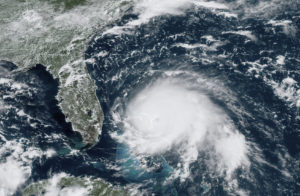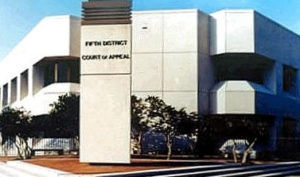Florida Supreme Court Hurricane Dorian Orders

National Oceanic and Atmospheric Administration (NOAA) image of Hurricane Dorian taken Sunday, Sept. 1, 2019, at 17:00 UTC.
On Wednesday, Thursday and Friday, as Dorian aimed away from Florida, the Florida Supreme Court issued several orders retroactively extending deadlines. For the whole list of trial court counties whose deadlines were affected, check out the Florida Supreme Court’s page linking to Emergency Request to Extend Time Periods Under All Florida Rules (including Hurricane Dorian orders). But here’s the summary for the appellate courts:
Second District: AOSC19-50 (Sept. 5, 2019)[.pdf] extends time limits “from the close of business on Friday, August 30, 2019 until the close of business on Wednesday September 4, 2019.”
Third District: AOSC19-44 (Sept. 4, 2019) [.pdf] also extends time limits “from the close of business on Friday, August 30, 2019 until the close of business on Wednesday September 4, 2019.”
Fourth District AOSC19-49 (Sept. 5, 2019) [.pdf] deadlines “extended from the close of business on Thursday, August 29, 2019, until the close of business on Thursday,September 5, 2019.”
Fifth District AOSC19-57 (Sept. 6, 2019)[.pdf] time limits ” extended from the close of business on Friday, August 30, 2019, until the close of business on Thursday, September 5, 2019.”
In all of the orders, the Court recognizes there may be additional need for enlargements, which “shall be resolved by the court in which jurisdiction is vested on a case-by-case basis when a party demonstrates that the lack of compliance with requisite time periods was directly attributable to this emergency and that equitable remedy is required.”
Don’t expect orders regarding the First DCA or the Supreme Court, because those courts did not close for Dorian.
The lesson for practitioners: Consider adding a hurricane plan to your business practices. We’re in Florida. It happens. And it’s disruptive even when there is no landfall. We have two more months until hurricane season is over for 2019.


